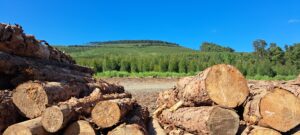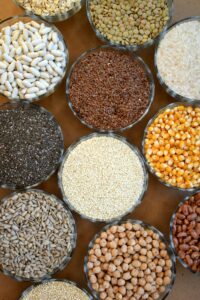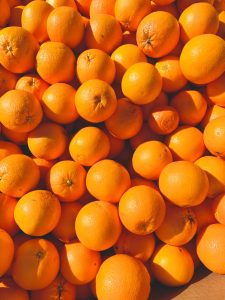
How responsible forestry can be part of a plastic pollution solution
Press release While life without plastic might be hard to imagine, there is a renewable, recyclable and sustainable alternative to single-use plastics and many other
The reader is directed to the previous blog to find out the circumstances which brought this small farming community together to protect the single aquifer which provides water here, to Verlorenvlei and to Elandsbaai on the coast. We disembarked and were met by David and Charlene Rothquel. I milled about, passed scattered conversations and looked for the best place to stand.
The Rothquels spoke at length about their farming activities. This hard-working couple run a mixed operation, farming organically. Olives, lavender, buchu are included amongst the products which come from here. A past fire had destroyed much of the infrastructure but things had since picked up and they have bought the farm. Among the party that joined us on the farm was one Goldie Weideman. I cannot say that she contributed to the discussions that followed, but she stayed with us for the whole afternoon, occasionally bumping into people, drawing looks, smiles, comments and chuckles but never smiling herself. Goldie Weideman has no idea that she is a sheep.
We were invited to see the farm and so we set off.
At the furtherest point of our walk, we paused at a tree used as a scratch pad by passing leopards. After this I thought I noticed a surreptitious look or two cast around by members of our party. Farmers respond to the leopards by keeping their flocks away from areas at the foot of the mountains, and bring livestock back to buildings and kraals at night. The impressive couple would not let us leave without each of us receiving a gift of both olive- and essential oils.
We passed neighbouring farms, one on which thoroughbred horses are bred, before pausing at a clearing where alien invasives have been weeded out, part of the Krom Antoniesrivier LandCare Project. Advantages from controlling alien vegetation are ecological and economic: less water lost, jobs created. A previous blog covers work done in this regard by the WWF Nedbank Green Trust.
And then we were on the R366, travelling west, travelling parallel to Verlorenvlei, the Ramsar-proclaimed wetlands and one of the few coastal fresh water lakes in the country; travelling mostly in silence while heaven and earth became one syllable. At the Elandsbaai Hotel we were shown our rooms and got ready for the evening.

Press release While life without plastic might be hard to imagine, there is a renewable, recyclable and sustainable alternative to single-use plastics and many other

According to a new report by Boston Consulting Group (BCG) entitled The Whole Truth about Whole Grains, there is huge opportunity in food system transformation,

Press release The Department of Agriculture, Land Reform and Rural Development (DALRRD) and the Department of Trade, Industry and Competition (the dtic) have announced that